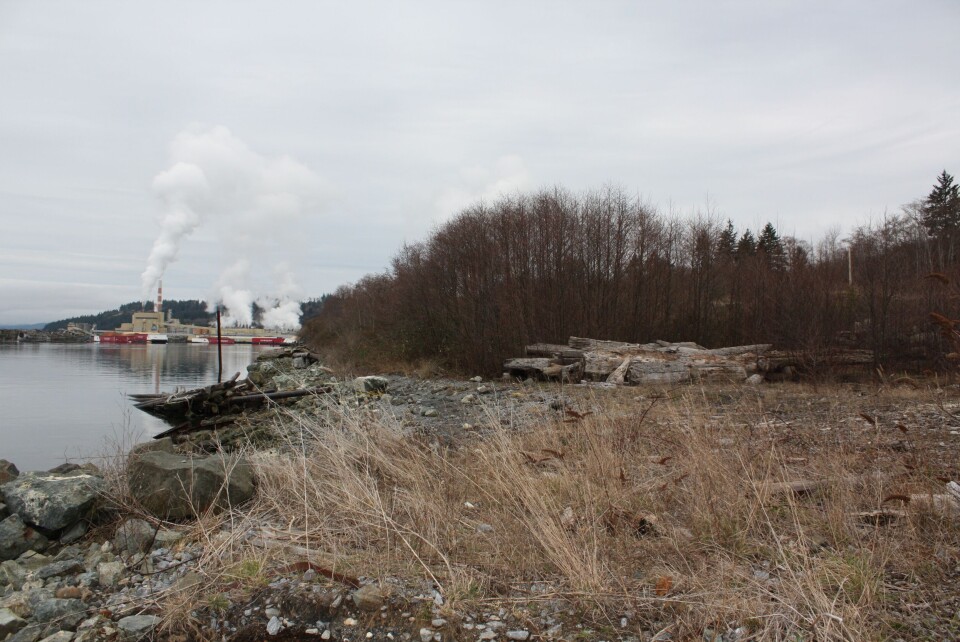
Aquaculture park plan pitched to Minister of Fisheries
Former fish farmer Bill Vernon is one of the driving forces behind an initiative to turn an empty waterfront property into a bustling aquaculture park with a range of tenants and different uses. A similar park is operating in Hawaii, with cold water from deep in the ocean is pumped up to support the production of cold-water fishes like Sablefish. Another property on Vancouver Island has been identified as another potential location for such an initiative.
As Laura Walz of the Powell River Peak reported yesterday, the federal Minister of Fisheries visited the city last week, and heard a presentation by the project promoters;
Mayor Dave Formosa, Mac Fraser, the city’s chief administrative officer, Scott Randolph, manager of Powell River Regional Economic Development Society (PRREDS), and Bill Vernon, the city’s consultant on the project, met with Fisheries Minister Gail Shea, as well as Randy Kamp, parliamentary secretary for fisheries and oceans, and MP John Weston on September 23 in West Vancouver. The city is exploring establishing an aquatic industries park in conjunction with Tla’amin (Sliammon) First Nation. The proposal centres on about 40 hectares (100 acres) of undeveloped waterfront land owned by PRSC Partnership Ltd. next to Catalyst Paper Corporation’s Powell River division. A number of aquaculture companies producing a wide range of sea life, including salmon, shellfish, black cod, sturgeon, algae and sea cucumber, have expressed an interest in being part of the facility. As well, post-secondary institutions and private sector companies have expressed an interest in the research and development aspect of the project. Weston, who represents West Vancouver-Sunshine Coast-Sea to Sky Country, is a member of the House of Commons’ Standing Committee on Fisheries and Oceans, which recently released a report on closed containment salmon aquaculture. One of the recommendations is to create a centre of excellence and Powell River has submitted a proposal to be that centre. Formosa said the meeting with Shea was positive. “She’s quite capable and knowledgeable in the industry,” he said. “Basically her comments were that based on the roundtable, she is going to have to look at the proposal and make a decision one way or another. She seemed very happy and intrigued by our presentation.” Formosa said he left the meeting feeling quite optimistic. “Our plans and our hopes of becoming a centre of excellence resonated with the minister,” he said. “She was genuinely interested and told us she would look at it in a lot of detail.” Shea also said she is going to have to deal with the situation, Formosa added, since it was a recommendation from the standing committee. “She said ‘I’m really happy to have this and I’ll be looking into it and basically you’ll be hearing more from us.’” Randolph said the Powell River contingent piqued the minister’s interest. “I think that we’ll probably be hearing back from them, in regard to how they might be able to assist us in moving it forward, or at least some suggestions on what we should be doing next,” he said. The city and Tla’amin have submitted a brief to the House of Commons Standing Committee on Finance, explained Randolph. “We believe that they have an opportunity to play a role in furthering the aquaculture industry in Canada by being involved in this project through the provision of financial support in research and development work,” he said. “We’ve lined up some post-secondary partners as well as some private sector research firms that have an interest in the project and support it.” The proposal requests the federal government provide $500,000 (~€ 357,000) in the first year for start-up costs, then $2 million (~€ 1,428,000) over five years. Weston arranged the meeting with Shea and he said Powell River officials did “really, really well” during the meeting. “Without committing the minister in any way, because she didn’t make any specific commitments, she’s clearly interested,” he said. “She saw what I see and what [Formosa] sees, that this could take all of the great things that Powell River has to offer and focus on an innovative project that could produce not only products for export and domestic use, but ideas and research for export and domestic use,” he said. “We have an opportunity to create something really exciting and without that close collaboration between levels of government, it wouldn’t work.” It’s estimated that the development of the aquaculture park could create over 200 well-paying technical jobs in the community as well as significantly increase tax revenues to the city.






















































